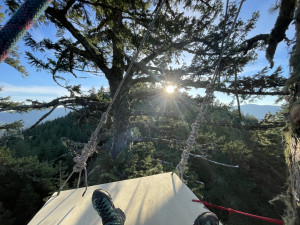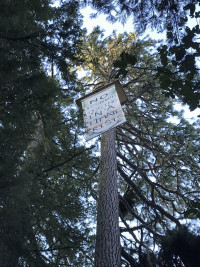

From a press release on Monday, April 1:
This morning, community activists set up a tree sit occupation in old growth trees slated to be logged outside of Wolf Creek in Southern Oregon, protesting the U.S. Bureau of Land Management's (BLM) Poor Windy project and, more broadly, the agency's continued practice of logging old growth and mature forests. The protest comes as the Biden Administration has committed to ending the practice of old growth logging on public lands, and as a rulemaking to establish greater protections for intact ecosystems is being considered by the BLM.
"In 2024, it is unbelievable that federal agencies continue to log irreplaceable, carbon rich, old growth and mature forest that helps to protect communities from out of control wildfire," said Salal Golden, one of the organizers and the person occupying the tree. "Protecting these forests is critical not just for our climate, but for our safety."
The Poor Windy project would log more than 15,000 acres, including 4,573 acres of mature and old-growth trees that are essential nesting, roosting and foraging habitat for the threatened northern spotted owl and many other species. Research has shown that industrial logging also increases wildfire severity and frequency by replacing fire resilient mature and old growth forests with monocrop timber plantations, increasing threats to rural communities like the one around this sale. The project specifically targets old growth forests with proposed road construction, an increasingly common tactic used by the BLM to avoid regulatory oversight.
"While we have seen some progress on logging practices from agencies like the Forest Service, the Bureau of Land Management is stuck in fifty years in the past, and has refused to stop its practice of targeting mature and old growth forests for cutting," said Sam Shields, a local community member. "In Oregon alone, the agency is targeting over 100,000 acres of forest for industrial logging with little consideration of the impacts to rural communities and the climate."
Poor Windy has been approved and there is active logging already taking place in some areas. The contentious project is one of countless sales being moved forward by the BLM despite criticisms about the impacts that they will have on habitat, wildfire, fresh water, and the climate. Studies have shown that Oregon's forests are some of the most carbon-rich in the world, and that logging is the State's single largest source of carbon emissions.
"Public forests are needed for public benefits, like carbon storage and wildfire resilience," said Francis Eatherington, a long time forest activist and Douglas County resident. "Instead they are being logging for private profit, lining the pockets of the timber millionaires at the expense of rural Oregonians."
The logging will impact fresh water sources in the area, with streams and the fish that depend on them already being compromised by severe sedimentation from more than 320 miles of logging roads in the area. Additionally, studies have shown significant long-term decreased summer stream flows in areas converted from mature and old-growth forests into plantations.


